

Cognitive Design. Canada Research Chair in Cognitive Geomatics. EMIR Laboratory (Exploration of Media Immersion for Rehabilitation) Life Fractures - Perceptions of Disability / Fractures d'une vie - perceptions de l'incapacité (Working Title) Are you sure you want to report this content?
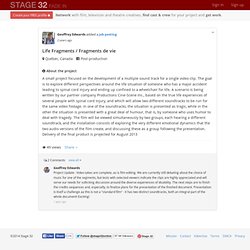
Life Fragments / Fragments de vie Québec, Canada Post-production About the project A small project focused on the development of a multiple sound track for a single video clip. The goal is to explore different perspectives around the life situation of someone who has a major accident leading to spinal cord injury and ending up confined to a wheelchair for life. 49 views Copy the link below to share this page: Second Skin - Understanding disability / Deuxième peau - vivre une incapacité (Working Title) The Living Wall / Le mur vivant. Are you sure you want to report this content?

The Living Wall / Le mur vivant Québec, Canada Development About the project An ambitious interactive mural installation for our rehab hospital. From initial concept to current development status has already taken five years (!) 18 views Copy the link below to share this page: L'accessibilité au plancher / Geo-access On The Floor (Working Title) Vertiges. Are you sure you want to report this content?
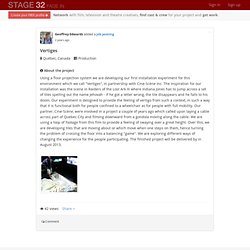
Vertiges Québec, Canada Production About the project. Pro(x)these (Working Title) Cognitive Disabilities. Defining cognitive disability is not easy, and definitions of cognitive disability are usually broad.

Persons with cognitive disabilities may have difficulty with various types of mental tasks. Intellectual disabilities, also known as developmental delay or mental retardation, are a group of disorders defined by diminished cognitive and adaptive development. Affecting more males than females, they are diagnosed in between one and three percent of the population. Many cognitive disabilities have a base in physiological or biological processes within the individual, such as a genetic disorder or a traumatic brain injury.
Other cognitive disabilities may be based in the chemistry or structure of the person's brain. Executive Function Skills and Disorders. Why do I need to register or sign in for WebMD to save?

We will provide you with a dropdown of all your saved articles when you are registered and signed in. Executive function refers to a set of mental skills that are coordinated in the brain's frontal lobe. Executive functions work together to help a person achieve goals. Executive function includes the ability to: Recommended Related to ADD-ADHD. Impaired judgement. Comprehension disorders. Reading disorder - children, causes, person, people, used, brain, skills, health. Photo by: Dmitriy Shironosov Definition Reading disorder is a learning disorder that involves significant impairment of reading accuracy, speed, or comprehension to the extent that the impairment interferes with academic achievement or activities of daily life.
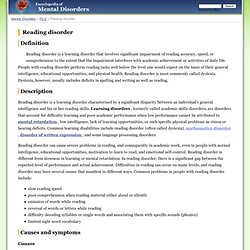
People with reading disorder perform reading tasks well below the level one would expect on the basis of their general intelligence, educational opportunities, and physical health. Reading disorder is most commonly called dyslexia. Dyslexia, however, usually includes deficits in spelling and writing as well as reading. Description. Spatio-visual disorders. What Designers Should Know About Visual Perception and Memory. When a visitor lands on your web page and begins to look around you hope your message is communicated clearly and understood.
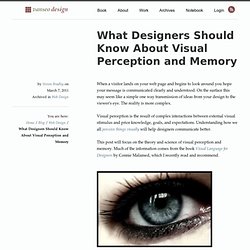
On the surface this may seem like a simple one way transmission of ideas from your design to the viewer’s eye. The reality is more complex. Visual perception is the result of complex interactions between external visual stimulus and prior knowledge, goals, and expectations. Auditory Processing Disorders (APD) in Children. By Teri James Bellis, PhD, CCC-A In recent years, there has been a dramatic upsurge in professional and public awareness of Auditory Processing Disorders (APD), also referred to as Central Auditory Processing Disorders (CAPD).
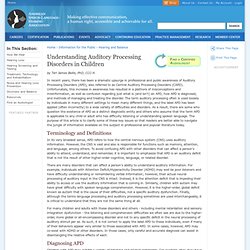
Unfortunately, this increase in awareness has resulted in a plethora of misconceptions and misinformation, as well as confusion regarding just what is (and isn't) an APD, how APD is diagnosed, and methods of managing and treating the disorder. The term auditory processing often is used loosely by individuals in many different settings to mean many different things, and the label APD has been applied (often incorrectly) to a wide variety of difficulties and disorders.
As a result, there are some who question the existence of APD as a distinct diagnostic entity and others who assume that the term APD is applicable to any child or adult who has difficulty listening or understanding spoken language. The Math Learning Disability: Developmental Dyscalculia. Math disabilities are notoriously difficult to specifically diagnose because math processing and problem solving often require the cooperation of many cognitive abilities.
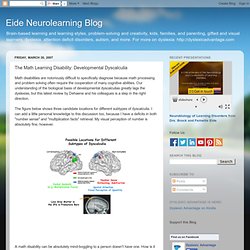
Our understanding of the biological basis of developmental dyscalculias greatly lags the dyslexias, but this latest review by Dehaene and his colleagues is a step in the right direction. The figure below shows three candidate locations for different subtypes of dyscalculia. I can add a little personal knowledge to this discussion too, because I have a deficits in both "number sense" and "multiplication facts" retrieval.
Functional Speech Disorders - What are they? Details Created on Thursday, 24 November 2011 10:45 Updated on Friday, 02 March 2012 12:14 Difficulty with one, or just a few sounds Functional speech disorder is one of several speech sound disorders that can occur in children and persist into adulthood.
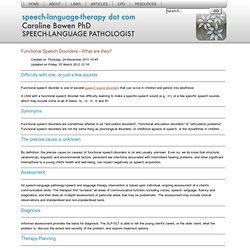
Memory Disorders. Memory disorders can range from mild to severe, but they all result from some kind of neurological damage to the structures of the brain, thus hindering the storage, retention and recollection of memories. Memory disorders can be progressive, like Alzheimer's or Huntington’s disease, or immediate, like those resulting from traumatic head injury.
Most disorders are exacerbated by the effects of ageing, which remains the single greatest risk factor for neurodegenerative diseases in general. Research and analysis of individual case studies of memory disorders (including cases such as "A.J. ", "H.M. Canadian Mental Health Association. Neuropsychology. Neuropsychology. Neuropsychology studies the structure and function of the brain as they relate to specific psychological processes and behaviors. It is seen as a clinical and experimental field of psychology that aims to study, assess, understand and treat behaviors directly related to brain functioning. The term neuropsychology has been applied to lesion studies in humans and animals. Cerebral cortex. The cerebral cortex is the outermost layered structure of neural tissue of the cerebrum (brain), in humans and other mammals.
It covers the cerebrum, and is divided into two cortices, along the sagittal plane, covering the left and right cerebral hemispheres. The medial longitudinal fissure is a deep groove that separates these two hemispheres. The cerebral cortex plays a key role in memory, attention, perceptual awareness, thought, language, and consciousness. The neocortex which is the major part of the cortex, consists of up to six horizontal layers, each with a different composition in terms of neurons and connectivity. Working Memory. By Saul McLeod published 2008, updated 2012. Spatial Cognition. Spatcog. Handbook of Spatial Cognition.
David Waller, PhD, is an associate professor of psychology at Miami University in Oxford, Ohio. His research seeks to understand all aspects of spatial functioning in people, including the ability to keep track of where things are in one's immediate environment, navigate between places, and remember spatial information. In addition to traditional laboratory experiments and correlational studies, his research has been at the leading edge of using real-time 3-D computer graphics as a tool for investigating environmental cognition. Dr. Human reasoning. Episodic Memory and Semantic Memory - Types of Memory. 2007_assets_leedey_providing_good_memory_cues. Context-aware Memory Aid for Alzheimer's Disease. Handbook of Episodic Memory. Amazon. Dreams and the brain. On the topic of dreams and the brain is a quote from William Dement a pioneering sleep researcher: “We experience a dream as real because it is real…the miracle is how, without any help from the sense organs, the brain replicates in the dream all the sensory information that creates the world we live in when we are awake.”
The brain is an amazing organ, and it is fascinating to discover the relationship between dreams and the brain and what is going on while we sleep. Read on to find out….. How the brain turns reality into dreams - Technology & science - Science - Mysteries of the Universe. WASHINGTON, Oct. 12, 2001 — Dreams make perfect sense when you’re having them. Yet, they leave you befuddled the next morning, wondering “where did that come from?” Cognitive benefits of sleep and their loss due to sleep deprivation. The Science of Breathing. How you breathe affects how you live; it's more than automatic. Two Centers in Brain Command Breathing Rhythm. Until now, scientists believed that a single area in the brain generated breathing rhythm, enabling breathing to speed up or slow down to adapt to the body's activity and position. How Exactly Does The Brain Control Breathing? Limbic system.
Your Brain On Sex. Sex and the Brain: Men's Health. TEDxGlasgow - Gary Wilson - The Great Porn Experiment. Mobile.alternet. Sex on the brain: What turns women on, mapped out - life - 05 August 2011. LectCerebellum. Training the Brain - Balance Tools of Choice. Posture-Brain Connection. Brain activation during maintenance of standing postures in humans. Getting It Straight: Posture and its Influence on Learning and Memory. Anatomy and function of the Brainstem. Changing your mind: Techniques. Multi, inter, Transdisciplinarity... Labyrinthe. Cognitive architecture. Implicit memory. Download Limit Exceeded. Psychology of Learning and Motivation - Chapter 2 Design for a Working Memory. Hierarchy of Cognitive Architectures. Comparison of cognitive architectures. Biologically inspired cognitive architectures. Cognitive distortion. 15 Styles of Distorted Thinking. Top 10 Common Faults In Human Thought.
List of cognitive biases. 5 Logical Fallacies That Make You Wrong More Than You Think. The Science of Why We Don't Believe Science. 10 More Common Faults in Human Thought. Recency illusion. 25 Acts of Body Language to Avoid.
Geoffrey Edwards.